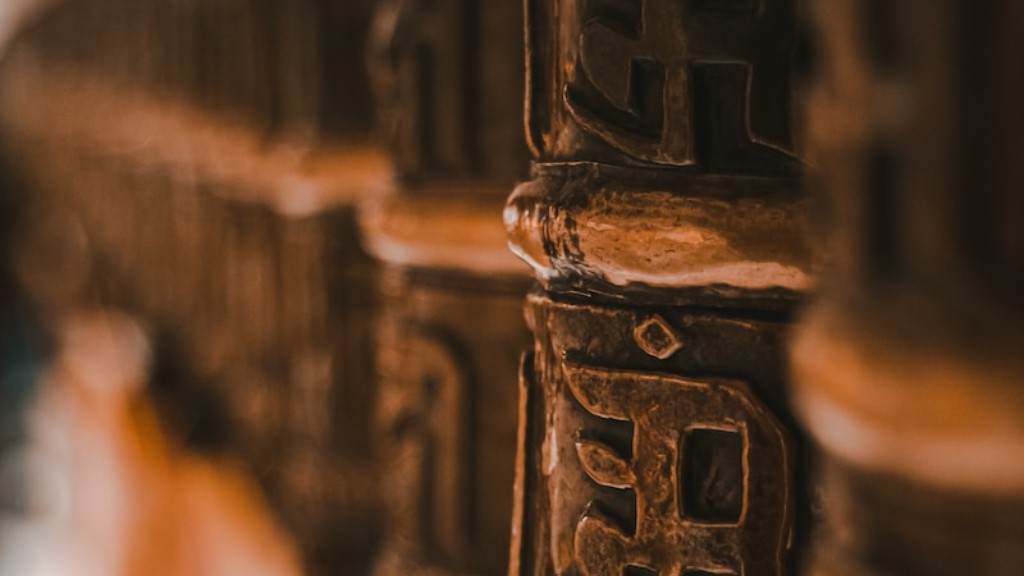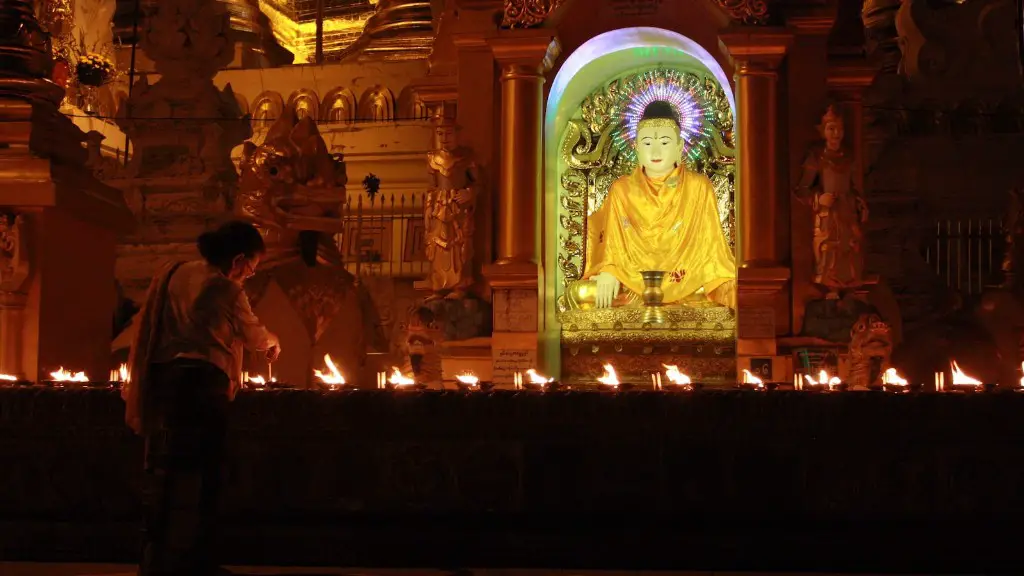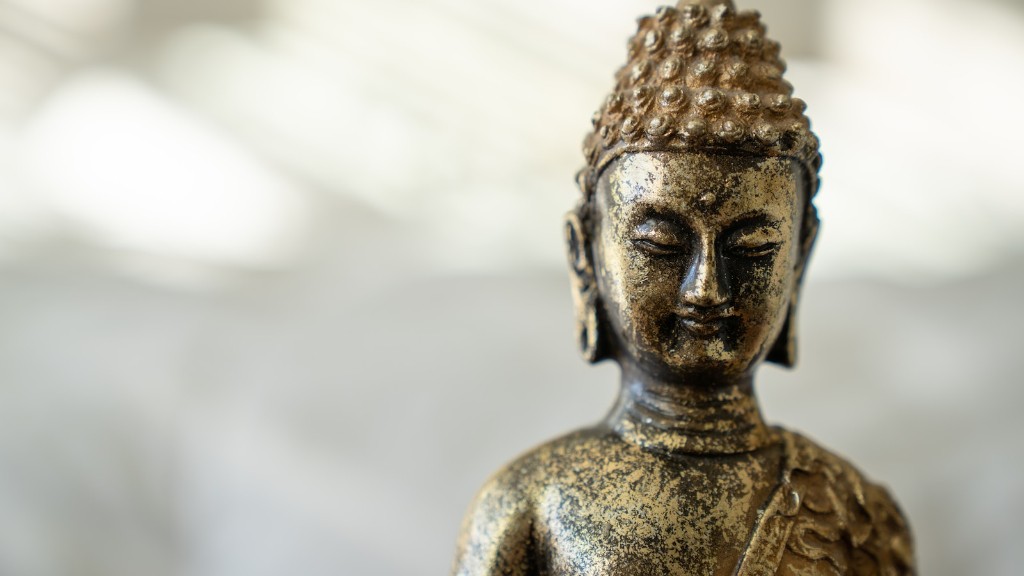Hinduism has many gods that are worshiped and revered, and the god of Hinduism is known as Brahman. Brahman is the ultimate Supreme Being in Hinduism, and is the source of all that exists in the universe. Brahman is thought to be both the material and the spiritual essence of all things, and is also the embodiment of truth, consciousness, and joy. Brahman is seen to pervade all things in the universe, including living and nonliving things, and is often referred to as the ground of being. Brahman is seen to be formless, infinite, and eternal, and it is believed that all other deities or personifications of Brahman are only expressions of a single, ultimate reality.
Brahman is often thought to manifest in various forms, such as Vishnu, Shiva, and Brahma, who are seen as different aspects of the same Force. Vishnu is seen as the preserver, Shiva is seen as the transformer, and Brahma is seen as the creator. All three aspects of Brahman are believed to be necessary to sustain the universe, and they all serve different roles in the cycle of life, death, and rebirth. According to Hindu beliefs, all three aspects of Brahman are necessary to maintain the balance of the universe.
In Hinduism, Brahman is also seen as the highest truth, and it is believed that when a person comes to realization of Brahman, they become one with Brahman and achieve ultimate freedom. This is referred to as moksha, or liberation. In Hinduism, it is believed that once a person realizes Brahman, they are liberated from the cycle of life, death and rebirth, and are united with the ultimate divine essence.
Although Brahman is seen as the ultimate reality and truth of the universe, there are also numerous gods and goddesses that are worshiped in Hinduism, such as Ganesha, Lakshmi, and Saraswati, who are all seen as different aspects of the same divinity that is Brahman. Each of these gods and goddesses have different roles and functions, and are venerated for their different qualities and attributes.
Hinduism is a complex and diverse religion, and it is believed that Brahman is the ultimate truth that permeates all things, and that all other gods and goddesses are just different expressions of Brahman. The devotion to Brahman is seen as the most important part of Hinduism, and it is believed that by understanding and realizing Brahman, one can achieve the ultimate liberation and freedom.
The Role of the Devotee in Hinduism
In Hinduism, the devotee seeks to realize Brahman by engaging in various practices and rituals. These include meditation, yoga, chanting mantras, and engaging in spiritual rituals. The devotee works to understand the divine essence of Brahman and to draw nearer in union with Brahman. The devotee also tries to live a life of devotion, peace, and harmony with all creatures in order to discover the truth within.
Devotion to Brahman is seen as the most important aspect of Hinduism, and the devotee is seen to be opening themselves up to the possibility of divine union with Brahman. Devotion to Brahman is also seen as the only way to liberation from the cycle of reincarnation and death. The devotee seeks to become one with Brahman and to know the true essence of being.
The Celebration of Brahman in Hinduism
Throughout Hinduism, different festivals and ceremonies are celebrated in honor of Brahman. These festivals generally honor different aspects of Brahman and are seen as an opportunity for devotees to deepen their understanding and appreciation of Brahman. Some of these festivals include Diwali, the festival of lights, Navratri, the festival of nine nights, and the celebration of Jagannath Puri, the celebration of Krishna. In all of these festivals, devotees chant mantras, light lamps and firecrackers, and make offerings to the gods and goddesses.
These festivals also serve as a time of renewal and rejuvenation as devotees come together to celebrate the divine essence of Brahman and to reaffirm their devotion. These festivals are a time for the devotees to celebrate and come closer in union with Brahman, as they seek to understand and realize the ultimate truth of being.
The Significance of Brahman in Hinduism
Brahman is seen as the ultimate force in Hinduism, and it is believed that Brahman is the source of all that exists in the universe. Brahman is seen as the force of truth, consciousness, and joy, and is believed to pervade all things in the universe. Brahman is seen to manifest in various forms, such as Vishnu, Shiva, and Brahma, who are all seen as different aspects of the same Force. In Hinduism, devotion to Brahman is seen as the most important thing, and it is believed that through understanding and realizing Brahman, one can achieve the ultimate liberation and freedom.
Brahman is also celebrated and venerated through various festivals and ceremonies, as devotees come together to deepen their understanding and appreciation of Brahman. These festivals are seen as a time of renewal and rejuvenation, as the devotees reaffirm their devotion to Brahman and seek to come nearer in union with Brahman. By realizing and understanding Brahman, it is believed that one is able to find the ultimate truth and peace that exists within.
The Different Beliefs About Brahman in Hinduism
In Hinduism, there are many different beliefs and interpretations regarding Brahman. Some believe that Brahman is the source of all creation, while others believe that Brahman is a personal god who is responsible for all life. Others believe that Brahman is an abstract concept that exists beyond physical form, and is the ultimate truth and reality. There are also some who view Brahman as a personal god that is all-powerful and all-knowing, who is responsible for both good and evil in the world.
No matter what belief one holds about Brahman, it is clear that Brahman is a central figure in Hinduism that is venerated and worshiped by many. Brahman is seen as the source of all that exists, and is believed to be the ultimate truth and reality. Devotion to Brahman is seen as the most important thing in Hinduism, and it is believed that by understanding and realizing Brahman, one can achieve the ultimate liberation and freedom.
The Various Ways of Worshiping Brahman
In Hinduism, people worship and venerate Brahman in many different ways. Some devotees engage in meditation, yoga, and chanting mantras in order to come closer in union with Brahman. Others engage in various spiritual rituals and offer prayers and offerings to Brahman. Hindus also celebrate various festivals and ceremonies in honor of Brahman, and use these occasions to reaffirm their devotion to Brahman and deepen their understanding and appreciation of Brahman.
Some devotees also seek to show their devotion to Brahman by living a life of peace, harmony, and compassion with all creatures. This is seen as an important part of one’s relationship with Brahman, as it is believed that one will become more attuned to the divine essence when trying to embody these qualities in their day to day life.
The Relationship of Brahman with Other Gods and Goddesses
In Hinduism, there are many other gods and goddesses that are venerated and worshipped in addition to Brahman. They are seen as different aspects of the same divine essence that is Brahman, and are thought to manifest in various forms. Devotees may worship one or multiple gods and goddesses in order to come closer in union with Brahman. The various gods and goddesses are seen to make up the larger divine pantheon, and each one is venerated for their different qualities and attributes.
The various gods and goddesses in Hinduism act as intermediaries for devotees to come closer in union with Brahman. No matter which god or goddess a devotee chooses to worship, all devotees seek to understand and realize the same divine essence that is Brahman. Through understanding and realizing Brahman, devotees seek to know the ultimate truth and peace that exists within.
The Importance of Realizing Brahman
In Hinduism, it is believed that by understanding and realizing Brahman, a person can achieve the ultimate liberation and freedom. This is seen as the highest aim of Hinduism, as it is believed that liberation from the cycle of life, death, and rebirth brings ultimate peace and enlightenment. Devotion to Brahman is seen as the most important aspect of Hinduism, and it is believed that by deepening one’s understanding of Brahman and manifesting devotion in one’s life, one can come closer in union with Brahman.
The ultimate truth of Brahman can be found in every aspect of life, and it is believed that by realizing Brahman, one can find the ultimate joy and peace that exists within. Hinduism is a complex and diverse religion, and Brahman is seen as the ultimate force in the universe. Devotion to Brahman is a central aspect of Hinduism, and it is believed that by understanding and realizing Brahman, one can achieve the ultimate liberation and freedom.



